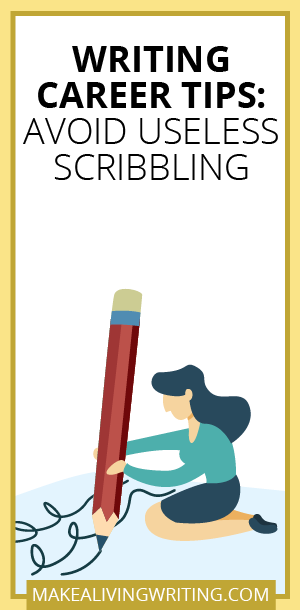 Do you love writing? Thinking of doing it for pay? Well, there’s a big difference between writing for the fun of it, and having a lucrative, bill-paying writing career.
Do you love writing? Thinking of doing it for pay? Well, there’s a big difference between writing for the fun of it, and having a lucrative, bill-paying writing career.
Every day, there are loads of things you could be writing, sure. But when you’re writing for money, time is of the essence. You’ll need to focus on the types of writing that will help move your writing career forward.
You might think, “Well, any writing is good. Because it’s all writing practice.” Right?
If you’ve got unlimited time, then sure. But if you have other commitments in your life — say, a day job, kids, a love life — you’ll need to be efficient here.
What writing tasks should you avoid wasting time on? Here’s my list:
1. A story in a vacuum
I hear from many, many writers who are sitting at home, writing articles for magazines. They’ve never talked to an editor, they have no assignment, but they’re ‘writing articles.’
Big thing to know: Most editors aren’t interested in pre-written articles they didn’t assign.
Unless you’re a mind-reader, you don’t really know what that editor wants. So this article is unlikely to ever see the light of day.
Editors who are willing to give pre-written pieces a look pay a lot less for them than they do for pieces they have a chance to shape. Or they’re happy to take them — but for free.
Also, some publications are more open to working with new writers, and some really won’t. If you’re yet another writer fantasizing that their first article will appear in AARP (the largest-circulation, best-paying magazine in America)…then this is a double-big time-waster.
The fix: If you want to write for magazines, learn to write query letters. Pitch editors, get assignments, and then write them. Stop writing articles in a vacuum, all by your lonesome, that will probably never be published.
2. Your own story
This is a big revelation for many new writers who’re new to freelancing. Maybe you’ve been writing in your journal, or blogging about your personal life.
Now, you want to earn, and you’re looking for a market that’ll pay big for your ‘take on things.’ Sadly, personal essays are among the lowest-paid gigs out there.
See, everybody wants to talk about themselves. And not that many people want to read this introspective work. So rates tend to be low.
It’ll be super-hard to earn a living as a freelance writer if you can’t change your orientation, to report stories with sources in it other than you — or to write for businesses. Where none of what you’ll write will be about you.
The fix: Realize that freelance writing is a service business. It’s not about getting your feelings out, or speaking your truth. It’s about serving clients’ needs. Learn what they need, and write that.
3. Your big manuscript
If writing articles without input is a waste of time, the only thing worse is writing an entire nonfiction book that you hope to traditionally publish…without a contract. Yet, it happens every day.
News flash: Nonfiction books are generally sold off a book proposal. That’s a sample chapter, table of contents, marketing plan, and an array of other related goodies. Not a full book manuscript.
The fix: I know, the writing part is so fun! But as with those article drafts, a book editor is going to want to shape your nonfiction tome’s direction. If you’re not self-publishing, do the book-publishing steps in order: Create a book proposal, seek representation, and get a contract with a publisher before you write your entire book.
4. The story of your work life
Here’s one that truly baffles me: Freelance writers who want to invest time writing their résumés. I’m always getting asked:
“What’s the best type of résumé format for writers?”
Bulletin: No good clients ask freelance writers for résumés. I haven’t sent one out in the past decade. Only crummy clients you meet in the dark corners of mass online job boards want you to send a résumé.
Why don’t writing clients want résumés? Because they’ve figured out your résumé isn’t a good indicator of whether you’d be a good writer for their job.
For that, sane clients look at your portfolio of clips. That’s where they can see your writing style and find out if it fits their needs.
The fix: Have samples! Hopefully, you’ve stashed some examples online somewhere (or are hard at work pitching pro bono work to get first samples). Focus on getting more actual client work done, and less time polishing the résumé, and you’re headed in the right direction.
5. I’ve got a little list…
Getting organized is always a great idea, if you’re launching a freelance-writing career.
But…to-do lists should not take over your life.
My rule is, 3-4 items are allowed per day, tops. So it shouldn’t be hard to keep those organized.
But I’ve learned some writers go down a deep, dark rabbit-hole with to-do lists. It turns into more of a procrastination device.
I recently had one student proudly inform me she’d spent most of the day “organizing my to-do list.” So, no time for writing today. But she was so excited about her to-do lists being in better order now.
Um. If your to-do list needs hours of reorganizing, you’re doing this wrong. Limit your list-making to 5-10 minutes a day, tops.
The fix: Remember the point of lists. It’s to remind you of your top priorities of the day, in case you’re in a fog from a bad night’s sleep. That’s it. Not writing Great Expectations here!
6. Just one thing
Do you get inquiries about whether you’d be willing to write a single blog post for a new client? Nothing else, thanks. Just the one blog post.
I do. And my answer is no. Every time.
Why?
Tiny, one-off jobs will never add up to a freelance living. They’re too small! There’s too much admin, ramp-up, and other non-billable hours involved.
The fix: If you’ve got a half-dozen writing samples to show, pass on tiny, one-off writing jobs. Hold out for clients who have ongoing work (and target those bigger prospects in your marketing).
7. Anonymous ‘samples’
Nothing breaks my heart like a writer who’s been out eagerly trying to get their first writing samples…except they forgot to set up the deal right.
They slave away on weekly blog posts for 2 years through some intermediary, under a nondisclosure agreement. Umpty-leven ghostwritten posts later, they have no clips they can claim, and don’t even know where their work is appearing.
The fix: When you do low-priced or free work to get started, make sure you can claim credit, get a testimonial, and use the work in your portfolio.
8. The hoped-for reprint
Here’s another common request I get:
“Can you tell me what markets will buy the posts I’ve published on my personal blog?”
The answer is none. Have you heard? Google doesn’t like duplicate content. Pretty much nobody who pays is seeking previously published work anymore.
I know! I can remember the good old days of reselling articles. Sadly, most of that has gone away now.
I’ve had to hold the sobbing heads of too many writers who thought they could put epic content on their blog and then make great money reselling it elsewhere. Understand that copyright attaches when you publish it on your blog, so you can no longer sell first or exclusive rights — and those are the rights good markets want.
The fix: Save some of your salable angles for pitches to paying sites! Remember, you can write slightly different slants on the same topic. But expect to create a fresh, completely unique post if you’re pitching the idea for pay and you’ve already written it up on your blog.
9. The social stem-winder
Lots of writers love Facebook. They write loads of status updates on there — and some of them are as long as a book chapter. I’ve met writers who’re all-in on telling long stories on one social platform or other.
Later, many of these writers wonder about marketing all the content they sweated over and then posted on social platforms. Thing is, few paying clients would be interested in ponying up for something that can be read for free online already.
The fix: Don’t give your best stuff to Facebook! Or Medium, or any other free social-media platform that could ban you, hide all your content, or disappear tomorrow.
Keep copies elsewhere of anything important you post in social media, in case it vanishes on the platform. Remember that posting there is publication — and that you won’t necessarily be able to control what happens to that content.
Think of social sites as good places to write short, pithy examples of your work. Save the sagas for paying customers.
Build your writing career faster
Once you cut these time-wasting writing activities, it clears the way to focus on tasks that stands a better chance of helping your writing career take flight. Examples include:
- Pro bono pieces for good prospects
- Actual client assignments
- Your writer website copy
- Prospecting emails
These are the types of writing that bring paychecks. See what you can do to cut the diversions and give yourself more time to make them happen.
Are you writing the right stuff? Let’s discuss on Facebook or LinkedIn.
The post Writing Career Tips: 9 Types of Useless Scribbling to Avoid appeared first on Make A Living Writing.
from Make A Living Writing https://ift.tt/2zRwF3I

No comments:
Post a Comment